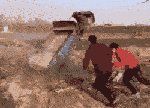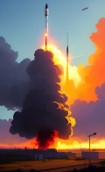|
The USA is deliberately subdued in its messaging and playing its role as a nuclear-armed state. It is completely normal and expected that it would not make a big deal out of it. I would be worried if the USA framed this war as a Great Patriotic War against Russia. It would imply only idiots remain in its higher echelons, and that's a mighty scary thought. cinci zoo sniper posted:https://www.ft.com/content/49233164-d28b-4d7d-868c-88e642e28e0b As speculated earlier, Germany is now putting everyone on blast for screaming about tanks. Pistorius talks a bit in the article about other countries sending tanks, and while not all of them are mentioned, the total by the article is like 17 2A6 (14 DE + 3 PT) and 30 2A4. Massive shade there at the readiness of Polish Leopards, though Poland disputes that and seems to be trying to convince Spain to send 2A4s (hopefully not to batch the refurb procurement request). Overall, German plan was to try sending 2 battalions (still idk which battalion this should be, but apparently NATO battalion) of tanks at once to Ukraine, and it's smelling increasingly dead now. überraschtes_pikachu_4k.png
|
|
|
|

|
| # ? May 23, 2024 11:02 |
|
Something this thread talks about from time to time (as well as Perun) is about escalation and boiling the metaphorical frog, like how NATO et al just couldn’t send dozens of tanks off the bat because it might make Russia jittery and how Russia has all these red lines. How does gently turning up the heat work with Russia (or I guess any nuclear adversary) when it comes to proxy wars? Do you experts in charge of these kind of things take time to figure out which red lines are bluster, which ones might provoke, etc? On one hand it seems like Russia has a lot of boundaries they never really acted on when crossed, but were those actual “trigger points” at one time early on that had to be avoided or what? I figure this sort of thing has existed since forever and there’s a lot of good examples of countries defeating an adversary after slowly boiling the frog, vs counties that played too quickly and got squished for it? The whole thing is pretty interesting to me and I’d like to learn more about diplomacy psychology, preferably in YouTube form so I could listen.
|
|
|
|
Antigravitas posted:The USA is deliberately subdued in its messaging and playing its role as a nuclear-armed state. It is completely normal and expected that it would not make a big deal out of it. For that matter, afaik USA wasn't boasting that much about the aid to Britain in early 1941 because the country was still at peace with Germany. Gears started running at a completely different speed after Pearl Harbor and Hitler's declaration of war. Also I just don't know if trying to lean into WW2 patriotic sentiments would really work for today's generations. Joe Biden's and Donald Trump's generation, for sure.
|
|
|
|
buglord posted:Something this thread talks about from time to time (as well as Perun) is about escalation and boiling the metaphorical frog, like how NATO et al just couldn’t send dozens of tanks off the bat because it might make Russia jittery and how Russia has all these red lines. Russia isn't the only frog being boiled. If you'd gone to a lot of politicians a year ago and asked them if they'd be willing to send tanks to Ukraine, it'd be a flat no but their thoughts and prayers are with them. Now they're scrambling to get inventories so they know how much they can send. The boiling frog isn't a deliberate strategy at a high level so much as a reality of how the West tends to do things. It can't turn on a dime because there isn't a ton of high level cohesion (compared to the Russian government). But they made a little investment, then another investment to secure that investment, then a little more, and now the Abrams is gonna do what it was born for.
|
|
|
|
Boris Galerkin posted:Why does the average American care about this when everything costs more, everyone* is earning less, and everything life in general sucks? My problem with this messaging is it inherently implies money spent on Ukraine would otherwise be spent on US citizens. Which is -never- going to ever be the case without a progressive majority in basically all 3 branches of the government. That and supporting Ukraine is generally the correct thing to do, even if it aligns with elite interests. Self-determination for a country is a good thing, and Ukraine's fate under Russia's yoke is Chechnya. And who would honestly willingly choose that? The conversation I'd rather my fellow american citizens have is along the lines of "The so-called second army of the world is explicitly and clearly a grand canyon behind us in technology, tactics, logistics, et al so why are we spending so much money on the military?"
|
|
|
|
buglord posted:Something this thread talks about from time to time (as well as Perun) is about escalation and boiling the metaphorical frog, like how NATO et al just couldn’t send dozens of tanks off the bat because it might make Russia jittery and how Russia has all these red lines. It's all Cold War poo poo. It's not a coincidence that the TFR de facto Ukraine thread is the Cold War (Air Power) thread. I think I've called the Russian red lines bluster irresponsible a number of times in this thread. The whole point of having a red line is that it's supposed to be credible, so your opponents takes it seriously and doesn't actually cross it. What Russia is doing is muddying the waters between real red lines and blustery fake ones. That increases the chances of miscalculation and escalation. And the worst thing is, I don't think it's a calculated move. I can't really point to anything concrete and comprehensive, it's just stuff I've absorbed over the years. But read these two articles: https://warontherocks.com/2017/11/false-allure-escalation-dominance/ and https://warontherocks.com/2023/02/the-case-for-caution-on-crimea/ Note the date on the former. It comes with a bunch of links to, well, Cold War poo poo. On Escalation by Herman Kahn being the big one. The latter article discusses some of red lines. And yes, there are people who just wonk it out all day over this in major governments. I don't have an abundance of trust in my own government, let alone foreign ones. But I'm trusting them on this one.
|
|
|
|
Nelson Mandingo posted:The conversation I'd rather my fellow american citizens have is along the lines of "The so-called second army of the world is explicitly and clearly a grand canyon behind us in technology, tactics, logistics, et al so why are we spending so much money on the military?" And the answer is, because this is all going to happen again, first in Taiwan, then somewhere else, forever, because that’s how humans are. And if everyone in the democratic world treats their military like an unwanted houseguest, then the Ukraines and Taiwans of the world will be at the mercy of their nearest aggressive neighbor.
|
|
|
|
Nelson Mandingo posted:My problem with this messaging is it inherently implies money spent on Ukraine would otherwise be spent on US citizens. Which is -never- going to ever be the case without a progressive majority in basically all 3 branches of the government. That and supporting Ukraine is generally the correct thing to do, even if it aligns with elite interests. Self-determination for a country is a good thing, and Ukraine's fate under Russia's yoke is Chechnya. And who would honestly willingly choose that? Because you literally now observe a country trying to subdue it's former colony and throws bodies upon it because weapons development money were stolen to every last kopeika
|
|
|
|
Nelson Mandingo posted:My problem with this messaging is it inherently implies money spent on Ukraine would otherwise be spent on US citizens. Which is -never- going to ever be the case without a progressive majority in basically all 3 branches of the government. That and supporting Ukraine is generally the correct thing to do, even if it aligns with elite interests. Self-determination for a country is a good thing, and Ukraine's fate under Russia's yoke is Chechnya. And who would honestly willingly choose that? My last post on this topic cause I don’t wanna eat a probe, but when I said the bit about being misguided I was alluding to that same fact that the money spent on Ukraine would have never been spent on the US people. I know this and you know this, but most people don’t know this. Even among my friends who work in the defense industry and are thus 100% benefiting from this spending are starting to wonder what’s up with all this money being shipped offshore? My friends are generally progressive engineers that are well paid so the current economic situation isn’t really hurting them. Nonetheless, they (my friends) have less well off friends and family they interact with on the daily who are being negatively affected and harmed, and their (my friends friends) situation sure as hell isn’t getting better with more money being shipped to Ukraine. It being the right thing to do doesn’t put food on the table.
|
|
|
|
Oh look there is after all no EU coalition willing to send tanks to Ukraine except, ironically, Germany Also, France, Italy sending less than 20% of what Germany or UK are giving while actually having a working army
|
|
|
|
Nelson Mandingo posted:My problem with this messaging is it inherently implies money spent on Ukraine would otherwise be spent on US citizens. Which is -never- going to ever be the case without a progressive majority in basically all 3 branches of the government. Yeah, it always reminds me of the brexit bus in the uk in the run up to the vote. The leave camp kept screaming that they could use the money they gave to Europe for the NHS instead. Which, of course, turned out to be a massive lie. Unfortunately, it worked on a lot of people.
|
|
|
|
NL doesn't have tanks, they're leasing 18 of them from Germany but Germany doesn't want to sell them back to them. They are buying some of the Rheinmetall Leo 1's and sending them over after refurbishment, but who knows how long that'll take?
|
|
|
|
Boris Galerkin posted:My last post on this topic cause I don’t wanna eat a probe, but when I said the bit about being misguided I was alluding to that same fact that the money spent on Ukraine would have never been spent on the US people. I know this and you know this, but most people don’t know this. Even among my friends who work in the defense industry and are thus 100% benefiting from this spending are starting to wonder what’s up with all this money being shipped offshore? My friends are generally progressive engineers that are well paid so the current economic situation isn’t really hurting them. Nonetheless, they (my friends) have less well off friends and family they interact with on the daily who are being negatively affected and harmed, and their (my friends friends) situation sure as hell isn’t getting better with more money being shipped to Ukraine. It being the right thing to do doesn’t put food on the table. I think the self-interested answer is "Inflation is through the roof in a large part because Russia is attempting a war of conquest. If Russia has a successful war of conquest then there are enough malign regimes around the world sitting across key strategic resources for the global economy that this becomes the default every 4-5 years. If you don't like the current economic situation, imagine another 20 years of this being the norm."
|
|
|
|
mrfart posted:Yeah, it always reminds me of the brexit bus in the uk in the run up to the vote. The leave camp kept screaming that they could use the money they gave to Europe for the NHS instead. Which, of course, turned out to be a massive lie. Reminder that rather than gaining extra money, leaving the EU has cost the UK possibly £100bn per year. 
|
|
|
|
Moon Slayer posted:I wish the administration would lean into this messaging a bit more, frame our (the US, that is) support of Ukraine as a patriotic endeavor reminiscent of these kind of pictures from World War 2. If you actually want the mission to succeed, the Biden administration is right to slowplay tooting their own horn on it. The quickest way to cause bipartisan support in the US for Ukraine to disappear is to start pushing it as a Dem win.
|
|
|
|
MikeC posted:As a former professional, what is your opinion of the odds that the Ukrainians (or anyone else) being able to shift away from attrition style warfare without air superiority and the ability for aircraft to support Ukrainian attacks? Last month Reuters had an article citing Pentagon officials trying to get the Ukrainians to stop attrition style fights like Bakhmut and to try and husband resources for counter offensives with a specific focus on trying to 'match Russia shell for shell' which was unsustainable for stockpiles. It's a good question. I don't think it's "air superiority" per se, but more the ability to deliver sustained overmatch in fires. The US military's means of achieving operational fire superiority is air power: prevent the enemy from flying anything at all; use precision large-payload strikes throughout operational depth. I think the US Army was actually somewhat prescient in realizing that modern anti-aircraft systems in a peer or near-peer fight was going to make things much harder for the US Air Force than it's accustomed to. Thus the focus on "precision long range fires", which is a huge part of the Army's current modernization effort. Basically, the Army figured it wouldn't always have air superiority on its side--much like the war in Ukraine today--and so invested in things like HIMARS. Or more correctly: the GMLRs and ATACMs munitions which HIMARS and MLRS can fire. I think one of the biggest capabilities a US mechanized division would bring would be a combined arms mech formation at scale. Ukraine has shown good aptitude for combined arms at the tactical level, but doesn't seem to have operational enablers at the scale of a US brigade combat team. Getting through a defensive belt is hard, but--at least 20 years ago--we're pretty good at synchronizing supporting fires, smoke (smoke! Ukraine and Russia both seem to barely use smoke), combat engineers, support-by-fire elements, and maneuver elements. Every tank company had two mine plows. The other big enabler would be night vision. Soviet-era tanks largely have passive night vision nights; American tanks have thermal sights. The latter is significantly better in terms of target acquisition, both in speed and in distance. The US Army also practices extensively at night-time operations. I'd estimate at least half of the gunnery and maneuver exercises I participated in were at night. Think about that for a moment. Russia--and Ukraine, for that matter--seem to lack the ability to run 24-hour operations with the same maneuver formations for several days. It's hard to do that unless basically every vehicles and at least half of your infantry have night vision, never mind the training. One of the things I'm most curious about with the new Ukraine formations being trained by Western forces is: are they training to fight at night, and are we quietly equipping those units with enough passive and thermal optics to enable multiple, brigade-sized formations to fight at night?
|
|
|
|
Ynglaur posted:The other big enabler would be night vision. Soviet-era tanks largely have passive night vision nights; American tanks have thermal sights. The latter is significantly better in terms of target acquisition, both in speed and in distance. The US Army also practices extensively at night-time operations. I'd estimate at least half of the gunnery and maneuver exercises I participated in were at night. Think about that for a moment. I came from the infantry side of things, but the attitude still seems to hold: if you can’t do fire/maneuver with live rounds at night/low-vis conditions, you’re way the gently caress behind as even a basic platoon leader. There’s an expensive logistical tail to putting a set of basic night vision optics on every soldier’s helmet, but there’s a very good reason it’s been pursued by nearly everybody since the first ones were introduced.
|
|
|
|
Icon Of Sin posted:I came from the infantry side of things, but the attitude still seems to hold: if you can’t do fire/maneuver with live rounds at night/low-vis conditions, you’re way the gently caress behind as even a basic platoon leader. There’s an expensive logistical tail to putting a set of basic night vision optics on every soldier’s helmet, but there’s a very good reason it’s been pursued by nearly everybody since the first ones were introduced. You actually call out a good point: that ability to fight at night / in smoke / both is trained from squad level all the way through brigade. And it's just not the maneuver elements. Supply convoys? Do it at night. Rebuild a power pack? Do it at night. Also cover all of your lights. Ammo resupply? Yep, better do that in the dark too. Turn off that loving flashlight, do you want them to see you? All that said, the other thing I would expect would be a much higher rate of casualties than the US has become accustomed to. Being inside of an armored vehicle is usually better than not being in one in terms of survivability, but 152mm HE will still ruin your day if it's close enough, and Russia has plenty of good anti-armor missile systems.
|
|
|
|
Anyone know why some of them are all tan and some have a black chassis and a tan turret?
|
|
|
|
EasilyConfused posted:Anyone know why some of them are all tan and some have a black chassis and a tan turret? Those would be transport covers.
|
|
|
|
One big scoop from today's NATO pressers is that Russia is piling combat aircraft, both fixed wing and rotor, towards the border. That's what has been up with the recent focus on getting more air defence gear to Ukrainians, apparently, rather than the missile strikes alone. 80% of Russian combat aircraft are estimated to be in a combat-worthy shape, and western analysts speculate that they may try to run an air campaign to help the struggling land forces. https://www.ft.com/content/3fd6e91f-71e4-4c02-9360-be20a2a78763
|
|
|
|
|
Ynglaur posted:You actually call out a good point: that ability to fight at night / in smoke / both is trained from squad level all the way through brigade. And it's just not the maneuver elements. Supply convoys? Do it at night. Rebuild a power pack? Do it at night. Also cover all of your lights. Ammo resupply? Yep, better do that in the dark too. Turn off that loving flashlight, do you want them to see you? As a regular army scout platoon we almost exclusively were only active at night with the daylight hours being primarily spent in observation posts. We had way more night vision and thermal optics than we did scouts. We pretty much never came within small arms range of enemy recon during force on force training, it came down to using fancy optics to spot the other side first and call for fire. I'm curious how other militaries compare when it comes to widespread adoption of night vision and thermal optics throughout their conventional ground forces.
|
|
|
|
Boris Galerkin posted:Why does the average American care about this when everything costs more, everyone* is earning less, and everything life in general sucks? People care about beating the other guy more than their material well being. You can see this by the continued success of republicans in red states. They don't care if they're poor as long they're dunking on the libs, sticking it to minorities, etc. This doesn't work just on conservatives. Sell the Russians as the enemy and the policy will be broadly popular.
|
|
|
|
I wonder how much could realistically be sent Ukraine's way for this? https://mobile.twitter.com/NOELreports/status/1625542830566301697
|
|
|
|
Charlz Guybon posted:I wonder how much could realistically be sent Ukraine's way for this? It's a pithy quote and not wrong in principle, but one which I feel like might come back to bite them in the rear end later. I'm not sure how much there is in the way of frozen Russian assets but if they end up not quite matching up the costs of reconstruction (as I suspect they won't) then it will be other taxpayers who end up helping rebuild Ukraine, and I think it would be useful and worthwhile to try to build enthusiasm for winning the peace as well as the war. Admittedly more difficult, though. I feel like messaging about aid to Ukraine is getting a bit tricky nowadays - fancy toys make good news articles about "amazing Western wonder weapons!" and feels like a big step, but as the earlier article about artillery noted increasingly logistics and supply of boring but necessary poo poo like shells is becoming a bigger and bigger deal. It'll be important, but maybe harder to get people excited about. Getting them excited about rebuilding once the dust clears and the explosions stop happening will be even harder, but ultimately even more important to the long-term future of Europe I feel.
|
|
|
|
Boris Galerkin posted:My last post on this topic cause I don’t wanna eat a probe, but when I said the bit about being misguided I was alluding to that same fact that the money spent on Ukraine would have never been spent on the US people. I know this and you know this, but most people don’t know this. Even among my friends who work in the defense industry and are thus 100% benefiting from this spending are starting to wonder what’s up with all this money being shipped offshore? My friends are generally progressive engineers that are well paid so the current economic situation isn’t really hurting them. Nonetheless, they (my friends) have less well off friends and family they interact with on the daily who are being negatively affected and harmed, and their (my friends friends) situation sure as hell isn’t getting better with more money being shipped to Ukraine. It being the right thing to do doesn’t put food on the table. Perun has a quote, that basically goes like "You can't pay teachers in Armored Personnel Carriers/Shells/etc." These stockpiles already exist and many are approaching their EOL phase anyways. For a lot of the older gear being sent, it'll actually save money in the longer run, because the maintenance/depoting/long term storage costs will no longer be draining the budget on mothballed systems
|
|
|
|
Thank you. Sobering but educational. My optimism level for the Ukrainians is kinda getting eroded. I always understood Russia to have the capability of sustaining attrition much better than the Ukrainians (especially if Western flow of arms slows) but I never thought Putin or the Russian state would have the appetite for a multiyear conflict on this level. I thought they would dig in after Kherson and declare 'victory' of a sort for public consumption and fall back to land gained and refreeze the conflict. Seeing the Russians gear up for mobilization round 2 along with another sustained attack up and down the line made me wonder how much work the Ukrainians would actually need to put in to change their approach to this fight. 4 or 5 more Bakhmuts doesn't seem sustainable for them. They guard their casualty numbers but it is clear Territorial brigades are being rotated through at a rapid pace and they had to recently commit regulars back into the fight to stabilize the area.
|
|
|
|
MikeC posted:Thank you. Sobering but educational. My optimism level for the Ukrainians is kinda getting eroded. I always understood Russia to have the capability of sustaining attrition much better than the Ukrainians (especially if Western flow of arms slows) but I never thought Putin or the Russian state would have the appetite for a multiyear conflict on this level. I thought they would dig in after Kherson and declare 'victory' of a sort for public consumption and fall back to land gained and refreeze the conflict. Seeing the Russians gear up for mobilization round 2 along with another sustained attack up and down the line made me wonder how much work the Ukrainians would actually need to put in to change their approach to this fight. 4 or 5 more Bakhmuts doesn't seem sustainable for them. They guard their casualty numbers but it is clear Territorial brigades are being rotated through at a rapid pace and they had to recently commit regulars back into the fight to stabilize the area. I too am anxious the Ukrainians are just going to get overwhelmed by sheer attrition from the Russian side. But I'm waiting until the Bradleys and Leopards land in country. Maybe that coupled with all the NATO trained personnel might flip the ratios hard enough that the numerical superiority the Russians have won't matter anymore.
|
|
|
|
Highlights from today's SECDEF and CJCS briefing following the contact group meeting. Not a lot in the brief today, all things considered. Intro and excerpts as I choose; I left most of it in. Highlights: -Emphasized wide range of countries donating major items and that 54 countries attended the contact group -SECDEF indicated the US sees nothing to back up rumors that Russia is amassing its air force, due to Russian land casualties. [My note: SECDEF went further to say that Russia hasn't really brought its air force into the fight. I'd say that they have, but after the opening, it has mostly been long-range aviation. Tactical air (fighter-bombers, etc) have been rather limited and risk-averse after taking some losses early on. Yeah, Russia and Ukraine have videos of lobbing unguided rockets parabolically, but that's not really the same as air-ground integration in support of maneuver. Russia has not lost their air forces; they just are not committing tac-air into a ground attack situation where they put them at risk for low reward. Russian CAPs remain active and generally considered a very serious threat to Ukrainian air power] -CJCS doesn't describe the warfare as one of art and maneuver, highlighting the comparatively stagnant lines, artillery, and waves of attacks on prepared defenses. [My note: Emphasis on waves of attacking forces, not "human wave," which is an annoying argument to get into and not what he said] -When asked, no discussion or plan of supplying Ukraine with aircraft right now -Highlights that it is already a massive undertaking to ship, field, and train operations and logistics on a wide variety of ground combat vehicles and air defense systems. -Kyiv is always at risk, but there are not indications and warnings of any imminent ground attack on Kyiv -Bakhmut remains to be seen, despite heavy Russian losses; Russia has a lot of forces and mobilized hundreds of thousands. https://www.defense.gov/News/Transc...y-chairman-joi/ quote:SECRETARY OF DEFENSE LLOYD J. AUSTIN III: Well, thanks, Patrick.
|
|
|
|
cinci zoo sniper posted:One big scoop from today's NATO pressers is that Russia is piling combat aircraft, both fixed wing and rotor, towards the border. That's what has been up with the recent focus on getting more air defence gear to Ukrainians, apparently, rather than the missile strikes alone. 80% of Russian combat aircraft are estimated to be in a combat-worthy shape, and western analysts speculate that they may try to run an air campaign to help the struggling land forces. https://www.ft.com/content/3fd6e91f-71e4-4c02-9360-be20a2a78763 You mean another air campaign, after the first one resulted in smoking dots of Sukhois and Kamovs all over the Ukrainian countryside
|
|
|
|
Boris Galerkin posted:My last post on this topic cause I don’t wanna eat a probe, but when I said the bit about being misguided I was alluding to that same fact that the money spent on Ukraine would have never been spent on the US people. I know this and you know this, but most people don’t know this. Even among my friends who work in the defense industry and are thus 100% benefiting from this spending are starting to wonder what’s up with all this money being shipped offshore? My friends are generally progressive engineers that are well paid so the current economic situation isn’t really hurting them. Nonetheless, they (my friends) have less well off friends and family they interact with on the daily who are being negatively affected and harmed, and their (my friends friends) situation sure as hell isn’t getting better with more money being shipped to Ukraine. It being the right thing to do doesn’t put food on the table. Because you friends literally can't grasp that Russia is a Geopolitical enemy like China.They are a existential threat.
|
|
|
|
Tomn posted:I'm not sure how much there is in the way of frozen Russian assets but if they end up not quite matching up the costs of reconstruction (as I suspect they won't) then it will be other taxpayers who end up helping rebuild Ukraine, and I think it would be useful and worthwhile to try to build enthusiasm for winning the peace as well as the war. Last spring the Guardian figured the Russian foreign reserves in allied custody at around 600 billion USD.
|
|
|
|
Agronox posted:Last spring the Guardian figured the Russian foreign reserves in allied custody at around 600 billion USD. I'm surprised it's not being used to buy weapons for Ukraine. If we're gonna Appropriate it, might as well go all-in
|
|
|
|
NTRabbit posted:You mean another air campaign, after the first one resulted in smoking dots of Sukhois and Kamovs all over the Ukrainian countryside One of the reasons for Russia's missile campaign against Ukrainian infrastructure was to run them out of missiles for their S-300s and other air defenses, and RUSI was warning months ago that Ukraine was running low and Russia could resume air attacks unless sufficient Western systems were supplied. I guess we might see about that fairly soon. And speaking of RUSI: https://twitter.com/Jack_Watling/status/1625677082490437632?s=20&t=v-LV3erLqMhExhzXk0bQSA Can't make it through the paywall from work, but Jack Watling is very much worth paying attention to.
|
|
|
|
Xerxes17 posted:Those would be transport covers. It looks to me there's covers on the turrets, but the bodies are in desert and woodland camo pattern. cinci zoo sniper posted:One big scoop from today's NATO pressers is that Russia is piling combat aircraft, both fixed wing and rotor, towards the border. That's what has been up with the recent focus on getting more air defence gear to Ukrainians, apparently, rather than the missile strikes alone. 80% of Russian combat aircraft are estimated to be in a combat-worthy shape, and western analysts speculate that they may try to run an air campaign to help the struggling land forces. https://www.ft.com/content/3fd6e91f-71e4-4c02-9360-be20a2a78763 I feel like the biggest issue is going to have sufficient maintenance facilities and skilled crews to keep the planes flying for more than a couple of missions. Attrition will be brutal before even factoring in Ukrainian fire.
|
|
|
|
Nelson Mandingo posted:My problem with this messaging is it inherently implies money spent on Ukraine would otherwise be spent on US citizens. Which is -never- going to ever be the case without a progressive majority in basically all 3 branches of the government. That and supporting Ukraine is generally the correct thing to do, even if it aligns with elite interests. Self-determination for a country is a good thing, and Ukraine's fate under Russia's yoke is Chechnya. And who would honestly willingly choose that? Russia hasn't been the second most powerful army in the world for a long time. That would be China and they're gearing up to challenge the current champion. That's why the U.S. is spending so much on the military.
|
|
|
|
Nelson Mandingo posted:Ukraine's fate under Russia's yoke is Chechnya. And who would honestly willingly choose that? Ramzan! i mean, hey, it's not like Yanukovych is busy these days
|
|
|
|
Kestral posted:And the answer is, because this is all going to happen again, first in Taiwan, then somewhere else, forever, because that’s how humans are. And if everyone in the democratic world treats their military like an unwanted houseguest, then the Ukraines and Taiwans of the world will be at the mercy of their nearest aggressive neighbor. the USA can do whatever they want, but looking e.g. at Germany ... public health insurance needs more funding, education needs more money, public unemployment support and other social support systems need more money, and the list goes on. I find it hard to justify spending any extra money on more tanks, bombs and guns, especially considering that Russia just took itself out and is no longer a serious threat to any Western / NATO country.
|
|
|
|
Hannibal Rex posted:Can't make it through the paywall from work, but Jack Watling is very much worth paying attention to. Try switching off JavaScript + private browsing
|
|
|
|

|
| # ? May 23, 2024 11:02 |
HolHorsejob posted:I'm surprised it's not being used to buy weapons for Ukraine. If we're gonna Appropriate it, might as well go all-in Appropriating it is not as easy as it seems, same as with breaking gas contracts with Russia, and so on – for legal reasons. It's very much a feature, though. Agronox posted:Last spring the Guardian figured the Russian foreign reserves in allied custody at around 600 billion USD. $600bn was total assets of Russia's central bank, the “war chest” they thought they had going into this. 630 billion USD, to be precise, out of which about 284 billion USD were frozen nearly immediately. However, the full figures are not precisely known. For instance, EU has counted only 33.8 billion EUR, and estimates about 258 billion USD to be further in the system, despite VDL putting out “300 billion in central bank assets and 20 billion in oligarch money” a few months ago. https://www.nbcnews.com/data-graphics/russian-bank-foreign-reserve-billions-frozen-sanctions-n1292153 https://www.bloomberg.com/news/articles/2023-02-09/eu-urged-to-make-banks-report-size-of-frozen-russian-assets
|
|
|
|
















































